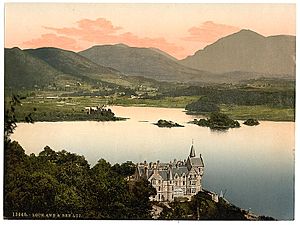Inishail facts for kids
Inishail (also called Inchald) is a small island in Loch Awe, Scotland. It used to be a separate parish, which is like a local area for a church.
Contents
Island Location and Look
Inishail is found at the northern end of Loch Awe. This beautiful loch is in the Argyll and Bute area of Scotland. The island sits between the village of Cladich and the famous Kilchurn Castle.
Among the many small islands in Loch Awe, Inishail stands out. It has a very green, grassy surface. This is why people sometimes call it the "Green Isle." Other islands nearby are usually covered with thick trees. Inishail is located between the rocky Pass of Brander and the village of Cladich.
A Glimpse into History
Inishail has a long history. The area it was once part of is now combined with Glen Orchy to form the parish of Glen Orchy and Inishail.
Ancient Buildings and Burials
On a small hill on the island, you can still see parts of an old building. These are the remains of a small chapel, possibly called the Chapel of St Fyndoca. Some people think there might have been a small convent or nunnery here long ago, but this is not certain. A convent is a place where religious women called nuns live.
After the Protestant Reformation, the land belonging to this religious site was given to a man named Hay. He had been an abbot (a leader in a monastery) but later became a Protestant.
The island also has an old burial ground. Here, you can find several ancient, carved tombstones. These stones have carvings that show they belonged to important people like church leaders, warriors, knights, and even nobles. Some of these special grave slabs might have been moved to the burial ground of Glenorchy Parish Church in Dalmally.
Burial Place of Dukes
While many Dukes and Duchesses of Argyll are buried at St Munn's Parish Church, Kilmun, two of them chose Inishail as their final resting place. The 11th and 12th Dukes of Argyll were buried on this quiet island in Loch Awe.
 | Isaac Myers |
 | D. Hamilton Jackson |
 | A. Philip Randolph |


